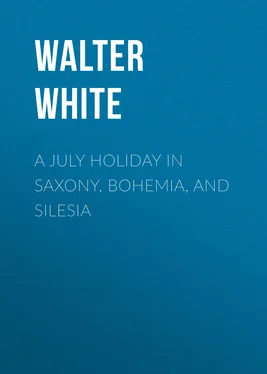Walter White - A July Holiday in Saxony, Bohemia, and Silesia
Здесь есть возможность читать онлайн «Walter White - A July Holiday in Saxony, Bohemia, and Silesia» — ознакомительный отрывок электронной книги совершенно бесплатно, а после прочтения отрывка купить полную версию. В некоторых случаях можно слушать аудио, скачать через торрент в формате fb2 и присутствует краткое содержание. Жанр: Путешествия и география, foreign_antique, на английском языке. Описание произведения, (предисловие) а так же отзывы посетителей доступны на портале библиотеки ЛибКат.
- Название:A July Holiday in Saxony, Bohemia, and Silesia
- Автор:
- Жанр:
- Год:неизвестен
- ISBN:нет данных
- Рейтинг книги:5 / 5. Голосов: 1
-
Избранное:Добавить в избранное
- Отзывы:
-
Ваша оценка:
- 100
- 1
- 2
- 3
- 4
- 5
A July Holiday in Saxony, Bohemia, and Silesia: краткое содержание, описание и аннотация
Предлагаем к чтению аннотацию, описание, краткое содержание или предисловие (зависит от того, что написал сам автор книги «A July Holiday in Saxony, Bohemia, and Silesia»). Если вы не нашли необходимую информацию о книге — напишите в комментариях, мы постараемся отыскать её.
A July Holiday in Saxony, Bohemia, and Silesia — читать онлайн ознакомительный отрывок
Ниже представлен текст книги, разбитый по страницам. Система сохранения места последней прочитанной страницы, позволяет с удобством читать онлайн бесплатно книгу «A July Holiday in Saxony, Bohemia, and Silesia», без необходимости каждый раз заново искать на чём Вы остановились. Поставьте закладку, и сможете в любой момент перейти на страницу, на которой закончили чтение.
Интервал:
Закладка:
Another pleasure-ground is the "Plateau," on an eminence between the railway station and the road to Leipzig, from which you may wander through shady alleys to the old ruin of Alexisburg. The cemetery, on a hill to the west of the town, is worth a visit for a sight of some of the tombs, among which appears the entrance to the new Princes' Vault, constructed in 1837, in the form of a small chapel, lighted by richly-stained glass windows, through the floor of which the coffins are lowered to the vault beneath. On St. John's Day the cemetery is thronged by the townsfolk, decorating the graves of their departed friends with flowers.
After a visit to all these places, and a peep into the two churches in which Luther once preached—the Bartholomäikirche and the Brüderkirche—I travelled on to Zwickau, and as there is little to be seen on the way besides fields, low hills, and the tall-chimneyed, smoking, stocking-weaving town of Werdau, we will glance at an interesting event in Saxon history incidentally alluded to in the foregoing pages.
CHAPTER III
Origin of Altenburg—Prosperous Burghers—A Princely Crime—Hussite Plunderers—Luther's Visits—French Bonfire—Electress Margaret's Dream—Kunz von Kauffungen—"Don't burn the Fish"—A Conspiracy—Midnight Robbers—Two Young Princes Stolen—The Flight—The Alarm—The Köhler—The Rescue—Kunz Beheaded—The Triller's Reward, and what a famous Author said concerning it.
Wends had long peopled the Pleissengau when King Henry I.—the Fowler, as his contemporaries named him—conquered it during one of his many inroads among his neighbours, and made it part of the Osterland early in the tenth century. The newly-won territory was soon settled by German colonists, who, finding an ancient fortification on the summit of a bluff, rocky hill, called it alte Burg , whence the present name of the town and principality of Altenburg. Henry, or his successor, Otho, built a castle on the hill, no portion of which, or of the one which replaced it, now remains. The town is first mentioned in a document of the year 986. Its story is the old one: family feud, rapine and revenge, chivalry and heroism, intermingled with quaint and quiet glimpses of social life, characteristic of the "dark ages." Earliest among its possessors were the Hohenstaufens; latest are the Hildburghausens. At one time it was imperial; at another independent; now pledged or given away by an emperor; now held by a duke. In 1286 its prosperity was such that the burghers went carried in sedan-chairs to the council-house, and their wives walked to church festivals on carpets spread before them in the street.
Six years later Friedrich the Bitted quarrelled with Adolf von Nassau for having pledged Altenburg to King Wenzel of Bohemia; whereupon Adolf invited Friedrich to a Christmas feast, and while he sat at table employed a ruffian to murder him, as the speediest way of settling the dispute. The blow, however, fell on the wrist of a burgher of Freiberg who rushed between, and lost his hand in preventing the crime. Friedrich escaped, changed his dress, and, under cover of night, fled the city; but, having gained a battle in the interval, he returned as ruler in 1307. The scene of this malignant assault is supposed to have been a house in the market-place.
Then came a succession of Friedrichs: the Earnest, the Strong, the Warlike, the Quarrelsome, the Mild, and such like. It was in 1430, during the lifetime of the last mentioned, that those fierce Reformers, the Hussites, came across the mountains and made an inroad into the principality. They chose Three-Kings' Day for their attack on the town, which was abandoned to them by the inhabitants, who fled to neighbouring villages, or took refuge in the castle; and, having burnt and plundered to the satisfaction of their cupidity or their conscience during four days, they left the place to recover as best it might.
The same Elector, Friedrich the Mild, married the Austrian Princess Margaret—fit wife for such a prince, if we may judge from her endeavours to prevent bread becoming too dear for the townsfolk.
Luther was in Altenburg from the 3rd to the 9th of January, 1519, to hold a conference with Karl von Miltitz, the papal legate. The two met in the house of George Spalatin, who became a firm friend of the great Reformer. Luther visited the town also when on his famous journey to Worms, and on several occasions afterwards.
The council-house was the scene of a religious conference from October, 1568, to March of the following year. The parties in presence were—the theologians of Electoral Saxony on the one hand, of Ducal Saxony on the other; and among the subjects mooted they discussed the questions, "Whether good works were needful for salvation?" and, "Whether man can co-operate in the attainment of his own salvation?" and with the usual result; for the disputants separated without coming to a decision.
The old town suffered from the disasters and commotions of the Peasants' War. The Imperialists quartered themselves upon it after the fatal battle of Lützen. The troubles of the Seven Years' War fell upon it, and of the campaigns that ended in the downfall of Napoleon. In 1810, the French commissioners seized a quantity of English manufactures in possession of resident merchants, and made a great bonfire therewith in the market-place. In 1813, the Emperors of Austria and Russia and the King of Prussia visited the town, and in the same year it afforded quarters to 671 generals, 46,617 officers, and 472,399 ordinary troops.
Now we must go back for awhile to the year 1455, the times of Friedrich the Mild. On the night of the 6th of July in that year the Electress Margaret, his wife, dreamt that two young oaks, growing in a forest near the castle, were torn up by a wild boar. Herein her maternal heart foreboded danger to the two princes Ernest and Albert, both still in their boyhood. The times were indeed disquieting, what with Hussite wars, territorial quarrels, and the ominous foretokens of the coming Reformation. Mild as Friedrich was, he, too, had had some fighting with his brother, Duke Wilhelm, about their lands. Among his officers was a certain Conrad, or, as he was commonly called, Kunz von Kauffungen, formerly captain of the castle, who, through disappointment, had come to entertain two causes of quarrel against his master. One was that, having been sent to surprise and capture Gera, he was taken himself, and only recovered his liberty by payment of four thousand florins ransom. Of this sum Kunz claimed reimbursement from the Elector, and met with denial. The second was, a demand for the restoration of estates of which he had been granted temporary possession, but which, defying legal authorities, he refused to give up until the coveted four thousand florins should be once more in his pocket. Chafing under his twofold grievance, he broke out into threats of reprisal, to which Friedrich answered jocularly, "Don't burn the fish in the ponds."
Baffled and exasperated, Kunz devised a scheme for bringing the question to a speedy issue: persuaded Hans Schwalbe, one of the scullions at the castle, into his interest; concerted measures with his brother Dietrich von Kauffungen, Wilhelm von Mosen, and others, thirty-seven altogether, and watched his opportunity.
Treacherous Schwalbe failed not in the service required of him, and gave information of the Elector's absence: called away by affairs to Leipzig. Whereupon Kunz and his confederates, mounting to horse, rode to Altenburg, and halted under cover of a wood—where now the pleasure-ground is laid out at the foot of the castle—between eleven and twelve in the night of the 7th of July. Finding all quiet, he sent his body-servant, Hans Schweinitz, forward to fix a rope ladder, with Schwalbe's help, at a window above the steepest side of the rock, and, following with Mosen, the two climbed up and got into the castle. Once in, they hastened to the chamber of the young princes, and each seizing one, made their way to the gate. But, instead of Albert, the little Count Barby had been picked up. Kunz was no sooner aware of the mistake, than, giving Ernest, whom he carried, into Mosen's arms, he hurried back with the terrified count, and brought out Albert. Quicker, however, than the robbery was the spread of an alarm. The Electress, apprehensive, perhaps, because of her dream on the previous night, appeared at a window, imploring Kunz to restore her children, and promising to intercede with the Elector in favour of his demands. Her entreaties and lamentations fell on deaf ears; Mosen had already made good his retreat, and Kunz speedily followed him through the gate, which was easily opened, there being but a single invalid on guard. The time was singularly favourable for the success of the plot, as nearly all the residents and functionaries were enjoying themselves at a feast given by the Chancellor in the town.
Читать дальшеИнтервал:
Закладка:
Похожие книги на «A July Holiday in Saxony, Bohemia, and Silesia»
Представляем Вашему вниманию похожие книги на «A July Holiday in Saxony, Bohemia, and Silesia» списком для выбора. Мы отобрали схожую по названию и смыслу литературу в надежде предоставить читателям больше вариантов отыскать новые, интересные, ещё непрочитанные произведения.
Обсуждение, отзывы о книге «A July Holiday in Saxony, Bohemia, and Silesia» и просто собственные мнения читателей. Оставьте ваши комментарии, напишите, что Вы думаете о произведении, его смысле или главных героях. Укажите что конкретно понравилось, а что нет, и почему Вы так считаете.












